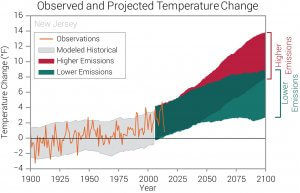Changing global climate patterns and warming temperatures are increasing the risk and vulnerability of numerous key transportation infrastructure assets, and new research from a CAIT-affiliated researcher suggests that this may include asphalt pavements as well. Dr. Hao Wang, whose past work has focused on eco-efficient pavement, infrastructure sustainability and resilience, and also serves on the Transportation Working Group of Rutgers’ Task Force on Carbon Neutrality and Climate Resilience, led this new study into climate change and the life cycle of asphalt pavement.

Average annual temperatures have increased by 3 degrees F. in New Jersey during the past century. Photo @National Oceanic and Atmospheric Administration.
A new study published by researchers at the Rutgers Center for Advanced Infrastructure and Transportation (CAIT) can help highway agencies, industry practitioners, and policy makers better understand the consequences of climate change on transportation infrastructure as well as new opportunities for resilience.
Dr. Hao Wang, an associate professor of civil and environmental engineering and CAIT-affiliated researcher, led the study on the life-cycle carbon footprint of asphalt pavement overlays under climate-change scenarios.
The team improved life-cycle assessment methodology considering time-dependent carbon dioxide decay in the atmosphere and quantified greenhouse gas (GHG) emissions of pavement from the production of pavement materials, construction, maintenance, use phase with moving vehicles, to the end-of-life treatment.
They found that future warming temperatures can lead to faster deterioration of pavement, resulting in the need for earlier or more frequent maintenance, Dr. Wang said. This brings about economic and performance-based challenges on its own, but, related to climate impacts, this finding suggests that pavement maintenance will also generate more greenhouse gas emissions in material and construction-related stages.
“Overall, we found that climate change accelerated pavement-structure damage and increased life-cycle carbon emissions over the study period,” Dr. Wang said. “Better understanding how roadway pavements deteriorate and are impacted by climate conditions through studies like this is important for asset owners at all levels as they develop future plans for infrastructure maintenance and resilience.”
The results of the study were recently published in Transportation Research Part D: Transport and Environment.
Another finding from the research suggested that due to more frequent maintenance in response to faster deterioration, pavement surfaces may become smoother, he said. This may actually lower the greenhouse gas emissions produced from the vehicles that drive on the pavement. But, considering the life-cycle assessment and after combining the GHG from material productions and construction activities and the fuel consumption of moving vehicles, researchers found that climate change would still accelerate pavement structure damage and increase life-cycle carbon emissions overall.
Dr. Wang said that pavement maintenance costs will be impacted by climate change, and that adjustments will be needed in order to plan for warming temperatures as well as to meet new resilience and performance needs.
While research has gone into sustainable pavement alternatives and new technologies, he also said that more research is needed into the environmental and climate-related impacts of pavement. In continuing this line of research, Dr. Wang said that future analyses will consider a wider range of roadway and pavement structures and uncertainties of climate variables, longer analysis periods, and be scaled up to larger geographical regions in the US.

The study examined the life-cycle carbon footprint of asphalt pavement under climate-change scenarios . Photo @iStock.
Some of his other research efforts at CAIT have addressed areas of infrastructure resilience, environmental sustainability, and climate. For example, this summer he published a book as one of editors, “Eco-efficient Pavement Construction Materials,” that provides engineers with the latest research on eco-efficient pavement materials and using green infrastructure to improve the sustainability of transportation infrastructure and systems.
He also led a Rutgers team in developing designs for an engineered permeable concrete that is highly effective in handling heat and can help reduce “urban heat island effect” in cities during the summer months that heats the air, posing human health risks and surface runoff.
“The further inclusion of climate change into infrastructure asset management planning introduces new barriers and opportunities for transportation infrastructure sustainability, resilience, and performance,” Dr. Wang said. “Appropriate infrastructure preservation and rehabilitation strategies are needed to reduce carbon footprint for mitigating climate change and to better position stakeholders for adapting to changing climate needs.”

